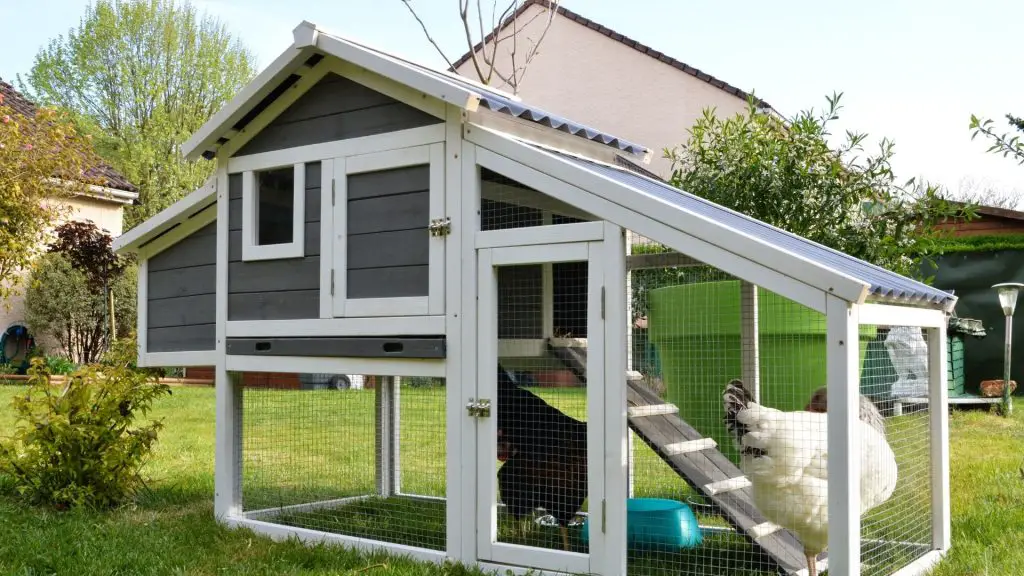Owning chickens has become increasingly popular over the last decade. Since it requires low maintenance and doesn’t require experience with livestock, you can do it even while living in the city! You just need a good chicken coop to house a healthy flock.
Where to buy chicken coops? You can buy chicken coops at most home improvement stores, big-box chains, and even within your local community. If you prefer buying online, Amazon is a great option. Additionally, you can also check out country/farm supply stores in your area.
In this article, you’ll learn more about where to buy chicken coops, what to look for, how much they cost, and whether it is a better option to build your own. Everyone’s situation is unique, so what works for your neighbor might not be right for you. Read on to explore this topic, so you can start raising your new feathered friends.
How Much Is a Chicken Coop?

Most hardware stores will have coops made for small animals, including those specifically made for chickens.
A chicken coop costs anywhere from $50 to as much as $2,000. Home Depot, for example, sells tiny cages for single chickens for as low as $50. A large coop suitable for a sizable backyard flock may sell for under $600. At Walmart, a jumbo-sized shack may cost $400.
The benefit of going with a hardware chain is that they offer installation, so you can hire someone to put it up for you. It saves valuable time for those who have little to spare.
As mentioned earlier, it can cost as low as $400 for a jumbo-sized shack at Walmart. Walmart also has metal pens for separating new chickens when chickens are first introduced and quarantined. Since Walmart doesn’t offer installation services, you’ll have to assemble the coop yourself. But don’t worry; premade coops come with easy-to-follow instructions.
Of course, you can find larger coops costing anywhere up to $2,000. They are more advanced models with exciting designs and features, though current reviews of the more expensive enclosures haven’t shown them significantly better than more affordable ones. These are good for up to 15 chickens, but keep in mind most city ordinances will regulate the number of hens you can keep in a single backyard.
If you’re interested in upcycling or buying used, you may be able to find something in your local classifieds. Facebook Marketplace, Craigslist, or just your city’s newspaper could have listings for chicken coops. These can be very cheap, and some may be free. It is a great way to support your local community, save some cash and protect the environment.
If you want something specific or more advanced, you may hire someone locally to build chicken coops based on your design. This is the most expensive option, and you’ll be paying for the materials, the labor, and the time. If you go this route, be prepared to spend a few hundred more than the most expensive prefabricated coops.
What Is the Best Chicken Coop to Buy?

No single brand is considered the best, as it comes down to what meets your needs. But there are some guidelines to follow if you want the best possible chicken coop for your backyard flock.
The best chicken coop to buy must be waterproof, with plenty of nesting boxes and enough space for the chicken to roost. It’s best to choose a chicken coop with a simple design for easy daily cleaning. Make sure the coop also provides easy access to eggs.
Other important tips:
- Give around 3 square feet (0.27 square meters) per chicken in the coop.
- Consider comfort features, like a dust bath, windows, and solar lighting.
- Add high roosting spots along the walls.
- Put some focus on a chicken run, with at least 4 square feet (0.37 square meters) per hen.
Should You Buy or Build a Chicken Coop?

You should build a chicken coop if you’re trying to save money or desire the freedom to control the coop’s design, size, aesthetic, and features. If the cost and design don’t matter much, you may consider buying a ready-made chicken coop.
If you choose to build your own chicken coop, though, you can always look for video tutorials and how-to articles to guide you. For example, YouTube is a fantastic resource for chicken coop instructions, with visuals perfect for the newer craftsman trying their hand at making their own.
The following are helpful if you’re considering building a chicken coop by yourself:
- Sit down and set a budget for your coop. Think of how much you can realistically afford. Ask yourself, too, if your budget matches up to the current cost of materials, such as lumber, chicken wire, shingles, bedding, etc. Then you have feeders and waterers, temperature control units, a run, and other necessities that will add to your final cost. Expect to pay half or less of the cost of an equivalent prefab coop.
- Consider the time involved. Even people who build things for a living will invest weeks or even months into the project. Depending on how much time you can dedicate to building your coop, you may spend more than 5 hours, 6 days a week, to complete the project. If you’re doing it for the first time, add a few weeks to the plan, regardless of how often you break out the toolbox.
- Think of the energy involved. It’s common to find half-built chicken coops in a backyard. Building a coop takes tremendous effort. You may find that it’s more challenging to stay focused than you anticipated despite your good intentions.
If any of the above 3 considerations will be a problem, you may be better off spending the money to buy a premade chicken coop. It’ll be an initial investment but well worth it for the benefits of owning your hens.
Whether you choose to buy a chicken coop or build your own, having a flock is an exciting prospect with many positives.
How to Know if Chicken Ownership Is Right for You?
Raising chickens seems like a cool idea as more people are moving towards sustainable living, but that doesn’t necessarily mean it’s suitable for you. While raising chickens doesn’t require much maintenance, you still need to put some work into it.
Consider Where You Live

Consider where you are living and who you are living around before you begin.
The USDA researched urban chicken raising and found that only 4 out of 10 people surveyed would be alright with their neighbors owning chickens. Most cite perceived risks of disease, noise, and smell as their reasons against the idea.
So before starting the project, ask your neighbors if they’re alright with you raising chickens next door.
Check Your Local Law

Laws are another critical factor to consider. Backyard chickens are not regulated by state law but by city ordinance. For example, Los Angeles allows you to keep chickens with some restrictions. If you travel further south into Coachella Valley, however, chickens are banned.
So, make sure you check out the rules for your city, as well as any limitations maintained by your HOA.
Consider the Daily Chicken Care Routines

While chickens have low maintenance, they still require some effort. Watch out for hens as they can be irritable, even aggressive, and thus pecking you. Some will even get a rooster to help keep their flock in line.
Just like any other pet, you need to provide them with a clean and healthy environment. If you don’t stay on top of cleaning, your chickens can leave a huge mess – feathers, droppings, and seeds.
On the plus side, chicken droppings make excellent organic fertilizer, and your garden will benefit. Even feathers and leftover feed can be used for compost. And then there are the fresh eggs you can pick every day.
Chickens may be a lot of work, but they are worth the effort.
Related: What to Know About Chicken Farming? | Explained for Beginners!
List of Sources
Chicken Feather Compost to Promote the Plant Growth Activity by Using Keratinolytic Bacteria
Keeping Backyard Chickens – What You Should Know
